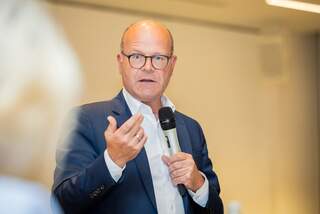
© Oliver Schenk
MEP Oliver Schenk: "We need a change of direction in politics"
What drives you to get involved as an MEP?
More than 8 billion people live on our planet. Today, we Europeans make up only seven percent of the world's population. Our continent lives in freedom with democracy and the rule of law. Our way of doing business allows each of us to take our lives into our own hands and shape them, while at the same time responding as a society to new challenges. But our way of life is under pressure worldwide. Over half of the world's population lives in authoritarian or semi-authoritarian systems. Democracies are the enemy of dictators. We can only preserve our freedom and pass it on to our children and grandchildren if we stand together. A united and strong Europe is a guarantee of this. The EU with its 27 member states makes up 450 million people. This makes us the third largest ‘country’ in the world after India and China and gives us much more power to determine things ourselves and to assert our interests worldwide. The stronger we stick together, the better we can do this. This applies in particular to our economy, which benefits greatly from the common market and whose innovative capacity benefits enormously from strong European networking in research. All of this must be strengthened and safeguarded in the changed climate of war and global tensions. The European Parliament has a special responsibility here. It is the only elected parliament in the world in which nation-states have transferred responsibilities to a transnational parliament. In Saxony, where my constituency is located, we have benefited enormously from this cohesion and great support following reunification. This is another reason for my desire to shape politics in Europe and to contribute to the cohesion of East and West.
In your opinion, what are the biggest challenges that European companies will have to face in the coming years?
Europe must regain its former economic strength. This is not just the responsibility of companies. This requires a joint effort from politics, business, and society. There needs to be an understanding at all levels that the challenges facing our free society can only be overcome with openness to innovation, courage, and a narrative for the future that is supported by the broad spectrum of society. The confusing „Ampel-Politik” must be replaced by reliability and the freedom to do business. Only if we succeed in this will we be able to master the challenges of growing competition from Asia and the USA, the opportunities of AI, and, above all, the development of new business models in a time of decarbonization. There are impressive examples of how German companies are making great progress with digital innovations in the development of new health therapies, developing resource-saving production processes, or becoming outstanding global market leaders in many niches. Unfortunately, we also see how our country is losing its dynamism and innovative strength. Brussels and Berlin must now wake up and change course. Hence I am glad that there is broad agreement in Brussels that the "Green Deal" must be followed by an "Industrial Deal".
How to #PowerUpEurope: How would you like to use your work in the Industry Committee to make Europe an attractive and strong business location again?
We need a change of direction in politics. We need to move away from overbearing policies that tell people and companies in detail how they should behave. The increasingly prescriptive and bureaucratic policies of recent years must be replaced by an approach that is open to technology and promotes innovation, which creates a new model of prosperity in which, for example, the economy and the environment develop well together and at the same time puts a stop to the current growing social polarisation. A key to the success of this approach will be the answer to the question of whether European companies set the trend and are involved when it comes to new data-driven business models and whether we in Europe manage to develop successful AI companies. Europe is in a good technological position, but implementation too often fails due to its own framework conditions. It is up to politicians to clear the way for European champions who also play an important role globally.



